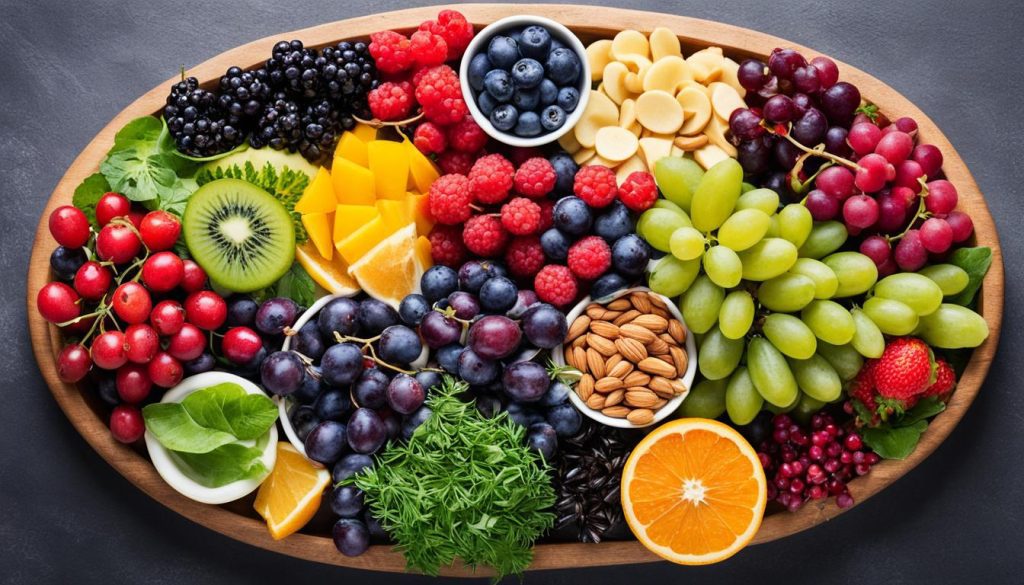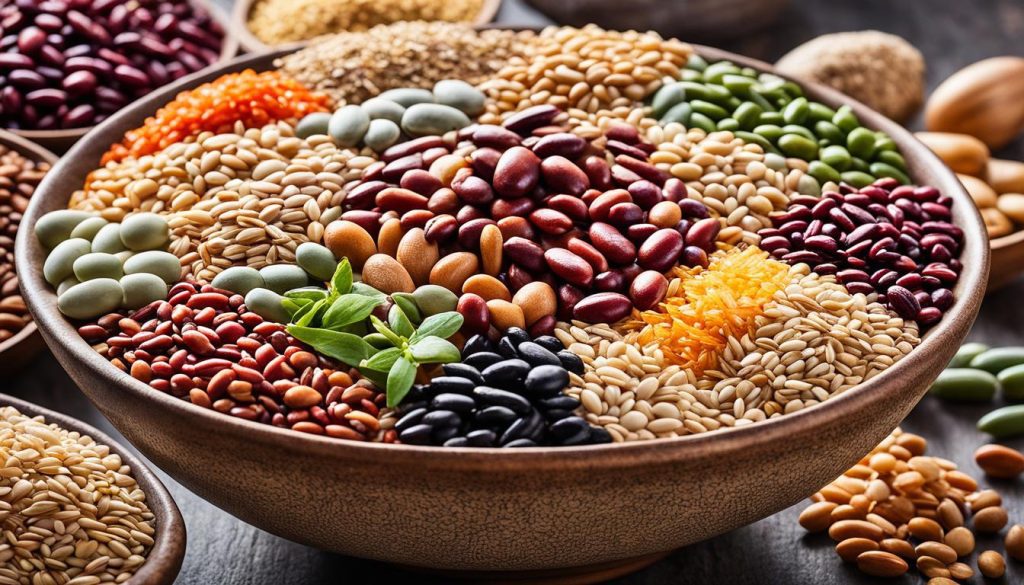Incorporating anti cancer plant foods into your diet can play a pivotal role in cancer prevention. While no single food can prevent cancer, a combination of the right plant-based foods can help reduce your risk.
According to the American Institute for Cancer Research, aim to include at least two-thirds of plant-based foods and one-third animal protein in your meals. Fruits and vegetables, especially those that are dark green, red, and orange in color, are rich in cancer-fighting nutrients. They can also help maintain a healthy body weight, which reduces the risk of cancer.
Foods high in naturally occurring folate, such as fortified breakfast cereals, whole wheat products, orange juice, melons, strawberries, asparagus, eggs, beans, sunflower seeds, and leafy green vegetables, may help protect against certain cancers.
On the other hand, it is recommended to limit the consumption of processed meats and foods preserved with smoking or salt, as they raise the risk of colorectal and stomach cancers.
Incorporating tomatoes, green tea, grapes, garlic, berries, cruciferous vegetables, turmeric, dark chocolate, whole grains, olive oil, and beans into your diet can provide you with cancer-fighting antioxidants and phytochemicals.
Drinking water regularly can also help reduce the risk of bladder cancer. Remember, it’s best to obtain cancer-fighting nutrients from natural food sources rather than supplements. A healthy, plant-based diet can contribute to your overall well-being and help in cancer prevention.
Anti Cancer Plant Foods
- Include a variety of fruits and vegetables, especially dark green, red, and orange ones, in your diet for cancer-fighting nutrients.
- Incorporate foods high in naturally occurring folate to help protect against certain cancers.
- Avoid processed meats and foods preserved with smoking or salt, as they raise the risk of colorectal and stomach cancers.
- Add tomatoes, green tea, grapes, garlic, berries, cruciferous vegetables, turmeric, dark chocolate, whole grains, olive oil, and beans to your diet for cancer-fighting antioxidants and phytochemicals.
- Drink water regularly to reduce the risk of bladder cancer.
The Power of Fruits and Vegetables in Cancer Prevention
Incorporating a wide variety of fruits and vegetables into your diet is essential for cancer prevention. These plant-based foods are rich in cancer-fighting nutrients, antioxidants, and phytochemicals. The more colorful the fruits and vegetables, the more nutrients they contain. Dark green, red, and orange vegetables are especially beneficial.
Consuming a variety of these fruits and vegetables can help lower the risk of various cancers, including colon, esophagus, and kidney cancers. Folate, a B vitamin found in abundance in fruits and vegetables, including orange juice, melons, strawberries, asparagus, beans, sunflower seeds, and leafy green vegetables, may provide additional protection against cancers of the colon, rectum, and breast.
It’s important to include these nutritious foods in your diet to maintain a healthy body weight, as excess weight is a risk factor for multiple cancers. Aim to incorporate a variety of fruits and vegetables to maximize the cancer-fighting potential of your meals.
The Benefits of Fruits and Vegetables:
- Provide essential nutrients and vitamins
- Rich in antioxidants and phytochemicals
- Help lower the risk of various cancers
- Support a healthy body weight
- Contribute to overall well-being
By incorporating a rainbow of colorful fruits and vegetables into your meals, you can harness the power of plant-based foods to support your cancer prevention efforts and promote optimal health.
The Role of Specific Foods in Cancer Prevention
Certain foods have been recognized for their specific benefits in cancer prevention. Incorporating these foods into your diet can provide you with a wide range of health benefits, including anti-inflammatory properties, an abundance of antioxidants, and cancer-fighting phytochemicals. Here are some key foods to consider:
Garlic
Garlic is known for its cancer-fighting properties and has been linked to a reduced risk of various types of cancer, particularly in digestive organs such as the esophagus, stomach, and colon.
Berries
Berries, such as blueberries, blackberries, and strawberries, are packed with antioxidants that can help prevent cell damage and inhibit tumor growth.
Cruciferous Vegetables
Cruciferous vegetables like broccoli, cabbage, and cauliflower contain compounds that protect against DNA damage, inhibit tumor growth, and promote cancer cell death.
Turmeric
Turmeric, with its active ingredient curcumin, has shown potential in reducing cancer risk, suppressing cancerous cell growth, and inhibiting the spread of tumors.
Dark Chocolate
Dark chocolate, when consumed in moderation, is also considered a cancer-fighting food due to its polyphenols, flavonoids, and antioxidants.
Incorporating these foods into your meals can not only add flavor but also contribute to your overall health and well-being. Additionally, you can use herbs and spices like garlic, turmeric, and ginger as flavorful additions to your dishes while benefiting from their cancer-fighting properties.
Remember, maintaining a balanced diet that includes a variety of nutrient-rich foods is key to optimizing your health and reducing the risk of cancer. By making informed food choices, you can harness the power of specific foods in cancer prevention.

The Benefits of Tomatoes and Grapes in Cancer Prevention
When it comes to cancer prevention, certain foods have shown promise in reducing the risk. Two of these foods are tomatoes and grapes. Tomatoes contain a powerful antioxidant called lycopene, which gives them their vibrant red color.
Studies have suggested that lycopene may help lower the risk of several types of cancer, including prostate cancer. Processed tomato products, such as tomato juice, sauce, or paste, have even greater cancer-fighting potential, as the processing can enhance the availability of lycopene.
Grapes, especially the purple and red varieties, are another food that has shown promise in cancer prevention. Grapes contain a compound called resveratrol, which is a powerful antioxidant with anti-inflammatory properties. Laboratory studies have suggested that resveratrol can help prevent cell damage that can trigger the cancer process. While more research is needed to definitively establish the cancer-preventing benefits of tomatoes and grapes, incorporating these foods into your diet can provide you with important nutrients and potent antioxidants.
The Importance of Whole Grains and Beans in Cancer Prevention
Whole grains and beans are essential components of a healthy diet for cancer prevention. These nutrient-rich foods offer a wide range of benefits that can help reduce the risk of developing cancer.
1. Whole Grains:
Incorporating whole grains, such as oatmeal, barley, brown rice, and whole-wheat bread and pasta, into your diet is a smart choice for cancer prevention. Whole grains are rich in fiber, antioxidants, and other beneficial nutrients that can help lower the risk of colorectal cancer. Research has shown that consuming whole grains may also reduce the risk of site-specific cancers like breast, gastric, and colon cancer. In contrast, refined grains have been linked to an increased risk of gastric and colon cancer. By opting for whole grains, you can improve your overall health and protect against cancer.
2. Beans:
Legumes, including beans, peas, and lentils, are another important addition to an anti-cancer diet plan. Beans are high in fiber and contain a variety of beneficial nutrients that contribute to cancer prevention. A study found that individuals with diets high in bean fiber were 20% less likely to develop breast cancer. Adding beans to your meals can provide essential nutrients, fiber, and anti-inflammatory benefits that can help lower your risk of cancer.
To take advantage of the cancer prevention benefits of whole grains and beans, incorporate them into your everyday meals. Swap refined grains for whole grains in your breakfast cereal, pasta, and bread choices. Choose whole-grain options when dining out or shopping for groceries. Include beans in soups, salads, stews, and main dishes. By prioritizing the inclusion of whole grains and beans in your diet, you can make significant strides in your efforts toward cancer prevention.

Harnessing the Power of Green Tea and Olive Oil in Cancer Prevention
When it comes to cancer prevention, two powerful foods that have shown promise are green tea and olive oil. Green tea, in particular, has been extensively studied for its potential cancer-fighting properties. It contains antioxidants called catechins, which have been shown to inhibit tumor growth in laboratory studies. Some studies have also linked tea consumption to a lower risk of bladder, stomach, pancreatic, and lung cancers.
While further research is needed to establish conclusive evidence, adding green tea to your daily routine can potentially provide cancer-fighting benefits. It’s a refreshing and delicious beverage that can be enjoyed hot or cold. Incorporate a cup or two of green tea into your daily routine to reap the potential health benefits.
Olive oil, particularly extra virgin olive oil, is another food that has been associated with a lower risk of certain cancers. Studies have shown that the Mediterranean diet, which is rich in olive oil, is linked to a reduced risk of gastrointestinal, breast, urinary tract, and upper aerodigestive cancers.
Incorporating olive oil into your diet can provide you with beneficial antioxidants and potentially reduce your risk of developing cancer. Use it as a healthy cooking oil, salad dressing, or drizzle it over roasted vegetables for a flavorful and nutritious boost.
The combination of green tea and olive oil can enhance your cancer prevention efforts. Enjoy a cup of green tea alongside a salad dressed with olive oil, or incorporate both into your daily meals to harness their potential benefits.
Conclusion
Incorporating anti cancer plant foods into your diet is an essential component of a cancer prevention plan. A balanced and varied diet that includes a wide range of fruits, vegetables, whole grains, beans, herbs, spices, tomatoes, grapes, green tea, and olive oil can provide your body with the necessary cancer-fighting antioxidants, phytochemicals, and essential nutrients. By choosing these natural anti cancer foods, you can help reduce inflammation, protect against DNA damage, inhibit tumor growth, and promote the death of cancer cells.
It’s important to note that while these foods can support your cancer prevention efforts, there is no single food that can guarantee complete protection against the disease. Additionally, supplements should not be seen as a substitute for a healthy diet based on natural food sources. To ensure your diet aligns with your individual needs and health conditions, it is advisable to consult with a healthcare professional before making any significant changes or considering supplements.
By making informed food choices and adopting a plant-based diet for cancer prevention, you can effectively harness the power of anti cancer plant foods and optimize your health in the ongoing fight against cancer. Remember, prevention is key, and incorporating these cancer-fighting superfoods into your daily meals can contribute to your overall well-being and long-term health.
FAQ
Can specific foods prevent cancer?
While no single food can prevent cancer, certain plant-based foods can help reduce your risk. Incorporating a variety of fruits, vegetables, whole grains, beans, herbs, spices, tomatoes, grapes, green tea, and olive oil into your diet can provide cancer-fighting antioxidants and nutrients.
What are the benefits of fruits and vegetables in cancer prevention?
Fruits and vegetables are rich in cancer-fighting nutrients, antioxidants, and phytochemicals. Dark green, red, and orange fruits and vegetables are especially beneficial. Consuming a variety of these colorful foods can help lower the risk of various cancers, including colon, esophagus, and kidney cancers.
Can specific foods play a role in cancer prevention?
Yes, certain foods have been recognized for their specific benefits in cancer prevention. Garlic, berries, cruciferous vegetables, turmeric, dark chocolate, and herbs and spices like garlic, turmeric, and ginger have all shown potential in reducing cancer risk and promoting overall health.
How do tomatoes and grapes contribute to cancer prevention?
Tomatoes contain lycopene, a pigment that has been linked to a reduced risk of several types of cancer, including prostate cancer. Grapes, especially purple and red grapes, contain resveratrol, a powerful antioxidant that can help prevent cell damage and inhibit tumor growth.
What is the role of whole grains and beans in cancer prevention?
Whole grains and beans are high in fiber and beneficial nutrients that can help lower the risk of certain cancers, including colorectal and breast cancer. Consuming whole grains and legumes as part of a balanced diet can provide essential nutrients, fiber, and anti-inflammatory benefits.
How can green tea and olive oil help in cancer prevention?
Green tea contains antioxidants called catechins that have been shown to inhibit tumor growth in laboratory studies. Olive oil, particularly extra virgin olive oil, has been associated with a lower risk of certain cancers. Incorporating green tea and olive oil into your diet can provide you with beneficial antioxidants and potentially reduce your risk of developing cancer.
What is the key takeaway for cancer prevention?
Incorporating anti cancer plant foods into your diet is an essential component of a cancer prevention plan. While no single food can guarantee protection against cancer, a balanced and varied diet that includes fruits, vegetables, whole grains, beans, herbs, spices, tomatoes, grapes, green tea, and olive oil can provide your body with cancer-fighting antioxidants, phytochemicals, and essential nutrients.




